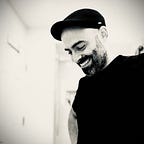The Rub
Hikaru Tanaka downs the rest of his whiskey and puts down the glass.
It had been his ninth that evening, well beyond the usual threshold.
He gets up from his chair and clumsily walks out into the expansive terrace, complete with a dining and lounge area. There was even a hot tub. A fucking hot tub. All from the vantage point of the 49th floor of an apartment in Minato Ward — the beating heart of Metropolitan Tokyo.
For two decades, the Mori Tower in Roppongi Hills has come to epitomize luxury for society’s most affluent and influential. Tanaka had even heard Haruki Murakami and Ayumi Hamasaki had once lived there. This rumor finally convinced him to pull the trigger on the 1.4 billion Yen, fifty-two-hundred square foot luxury condominium.
Now, alone in his comically gargantuan sky mansion, Hikaru Tanaka wonders if any of it was worth it.
More importantly, is any of it still worth it?
He heads back inside, picks up the bottle, and is about to pour himself another when a thought stops him: What kind of courage can ten glasses give you that nine can’t?
He sets the half-empty bottle down and walks outside again, feeling the warm Tokyo air on his face. The whiskey in his stomach lends a different kind of warmth.
Liquid courage.
He presses his stomach into the railing and leans slightly over the balcony’s edge, closing his eyes and dangling his arms out front, swaying unsteadily from side to side.
There’s a voice inside him.
All it takes is a little lean forward.
He doesn’t suppress the thought.
Just lean … and all your troubles will vanish.
He relishes the notion, letting the idea breathe like a fine wine.
The fear will only last a few moments, only to be replaced with quietness.
He contemplates it.
Nothingness.
He wants it.
Peace.
But he can’t do it.
“Fuuuck!” he screams.
* * *
Hikaru Tanaka had had immeasurable success in his career by keeping his company in the top five on the Nikkei index for a staggering twelve consecutive years.
He was a captain of industry, an entrepreneur, a philosopher, and a philanthropist. He was a four-time Bunka Kōrōsha Award recipient, for heaven’s sake.
Of course he couldn’t kill himself.
He wanted to. Oh, how he wanted to.
At eight o’clock tomorrow morning at his company’s annual board meeting, the principal shareholders will find out what Tanaka had discovered two hours and twenty minutes — or nine whiskeys — ago.
Their company — a company Tanaka’s grandfather had built and Tanaka helped catapult into a Japanese institution — was about to go through a hostile takeover.
The details were still fuzzy, but that it was hostile was not in question. He still remembers the timbre of that smug son of a bitch’s voice when he said, “Don’t think of it as a bear. Whether it’s a hostile takeover or a friendly merger is a matter of attitude. I’ll leave the choice to you.”
That was over two hours ago, and all Tanaka had done since was drink and think.
The takeover was terrible enough, but that wasn’t why he was acting like a desperate man who just got laid off and not like a multi-millionaire who owned a building for each one of his children’s children.
The reason was in the discovery documents that would surface in the proceedings.
It wasn’t an original story.
The company didn’t have sterling beginnings. What company that started during the war did? There was enough evidence in those books about shady investors, bad actors, and cover-ups to warrant a larger investigation, at which point the skeletons Tanaka, his father, and his grandfather before him had painstakingly buried over the decades would begin to stink.
Metaphorically speaking, of course.
Mostly.
At best, Tanaka was in for a public humiliation, shaming, and fall from grace; he’d be ousted from the board and lose control of the company, his job, wealth, and dignity.
At worst, he would experience all of the above and then be prosecuted and sentenced to fifteen years in a federal prison where white-collar criminals like him — with ¥30,000 haircuts, delicate bone structure, and manicured fingers — get eaten for breakfast.
Since he’d heard the phrase ‘federal charges’ on the phone earlier, his imagination had gone on a wild ride through a rolodex of the cruel and usual horrors he’d encounter in prison.
There was also the third option.
But he’d already discovered he couldn’t do it. As it turns out, even when staring down the barrel of the biggest canon you’ve ever seen, on the brink of certain catastrophe, life is still preferable to death.
How about that?
* * *
He screams a fresh chorus of obscenities into the sky before dropping his head.
Then he raises it and recites a snippet from an old English soliloquy he’d memorized from his days at Cambridge: “The undiscovere’d country from whose bourn no traveller returns … puzzles the will and makes us rather bear those ills we have, than fly to others that we know not of.”
Tanka turns around, walks back inside, snatches the bottle from the kitchen table, and slumps down on his Eames lounge chair, muttering “Thus conscience does make cowards of us all.”
He then takes a swig from the bottle that gets him halfway to ten drinks.
Tomorrow, he faces the music.
“Conscience does make cowards of us all,” he says again.
